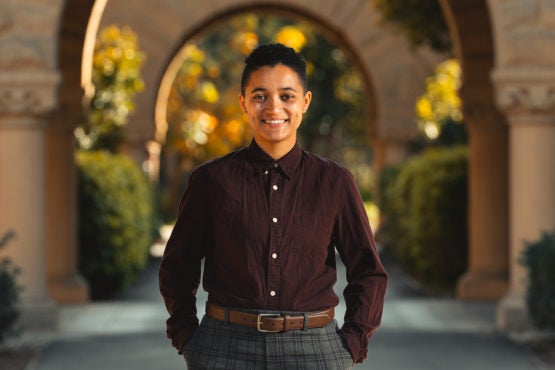Learning sociological research skills leads Stanford senior to a career path toward exploring racial injustice
For one local community college student, a research internship at Stanford sparked an intellectual journey that led them to transfer to the Farm and study how the media portrays police killings of black Americans.
Rarely does debating politics at the family dinner table end well.

A research internship at Stanford sparked an intellectual journey that led Atlanta Rydzik to transfer to the Farm and study how the media portrays police killings of black Americans. (Image credit: Andrew Brodhead)
But just such a heated discussion led Stanford sociology major Atlanta Rydzik to the Farm, a senior honors thesis and soon, graduate school.
Rydzik remembers the exchange over Thanksgiving dinner well. It was 2014, the year Michael Brown, an unarmed black teenager, was fatally shot by a white police officer in Ferguson, Missouri. Where and how often Brown was shot was a contentious point for many, including Rydzik’s family.
“It was something that was super controversial,” Rydzik recalled. “I remember my family was like, ‘Well, this article came out and said this thing,’ and then someone else was like, ‘Well, actually another article came out and said it wasn’t true.’”
Rydzik was struck by the conflicting news narratives, and ever since has studied issues related to police violence, criminal justice and the media – both at Stanford and at Foothill College, where Rydzik earned an associate degree in sociology before transferring to the Farm. It was at Foothill College where Rydzik discovered the Social Science Research Assistant (RA) Internship Program offered by Stanford’s Institute for Research in the Social Sciences.
The program matches local community college students interested in social science research with Stanford graduate and postdoctoral scholars in psychology, sociology, education, communication and other social science-related disciplines. Over the course of an academic year or summer, interns help Stanford scholars with their research and learn firsthand how to gather and analyze data, survey methods and other research techniques.
Rydzik was paired with Shea Streeter, who was then a doctoral candidate in political science. Streeter was in the midst of researching racial disparities in police killings when Rydzik joined her research team.
“They are very intentional about you getting to work on something you actually care about, which I had never had the opportunity to do before,” said Rydzik, who is the first in their family to attend college.
Rydzik was tasked with helping Streeter build a unique data set comprised of nearly 1,200 police-related deaths. Rydzik’s job was to comb through hundreds of newspaper articles for details that led to the lethal interaction – all of which Rydzik coded into variables for Streeter’s analysis.
Poring over these articles, Rydzik observed a recurring theme that was reminiscent of the exchange that Thanksgiving supper from a few years earlier.
“I was reading through all these articles and filling out all these details and I noticed some of the articles were written really differently than others,” Rydzik said. “There was so much variation and I wondered why that was.”
After Rydzik transferred to Stanford, learning how news outlets report policing killings became the central focus for their senior honor’s thesis.
Using the skills learned through the RA program, Rydzik compiled an original dataset of 561 news articles written about 120 police homicide incidents from 2018.
“Anyone who has conducted this kind of close coding of news reports knows that this is tedious and sometimes mind-numbing work,” said Forrest Stuart, an associate professor of sociology in the School of Humanities and Sciences and Rydzik’s thesis adviser. “And yet, Atlanta dove into the coding process with a level of excitement and dedication that I have rarely seen.”
Rydzik’s data analysis showed that black victims were more likely than white victims to be described as “violent” and “erratic.” Their deaths were also more likely to be episodically framed, with an emphasis on the individual rather than on the officer or systemic racism that underpins police violence, Rydzik said.
From research fundamentals to future scholarship
Rydzik credits their growing intellectual curiosity to the RA Internship Program.
It was thanks to Streeter’s mentorship that Rydzik learned how to conduct social scientific research and what graduate school is like, which is Rydzik’s next step.
“The RA internship program was foundational to my experiences here,” Rydzik said. “It directly shaped my honors thesis, which has evolved into a writing sample for graduate school and hopefully someday I’ll publish it. That program was everything.”
To date, 210 students from two community colleges – Foothill College and Mission College – have interned for scholars in psychology, sociology, education, communication and other social science-related disciplines through the RA program.
Like Rydzik, other students in the program have successfully transferred to four-year universities including UCLA, UC Berkeley, UC San Diego, UC Santa Barbara, Columbia University, Georgetown University, San Francisco State and the University of Toronto.
In addition to the RA internship program, IRiSS also offers the Research Experience Program that invites community college students to participate in Stanford-led research studies in exchange for college credit. Interested community college students can learn more on the IRiSS website.
